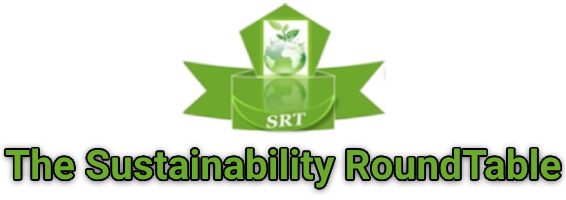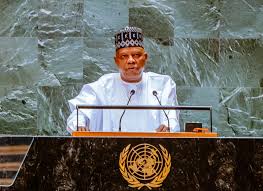Sustainable Development in Limbo: Nigeria’s Inconsistent Pursuit of the SDGs and the Global Race to 2030
By: Eric Adile Iroajugh
A Decade of Delay
The Sustainable Development Goals (SDGs), adopted by all United Nations Member States in 2015, represent a global blueprint to achieve a better and more sustainable future for all by 2030. These 17 interconnected goals address a broad range of global challenges, including poverty, inequality, climate change, environmental degradation, peace, and justice. However, with only six years remaining to the 2030 deadline, many countries, including Nigeria, are struggling to make substantial progress.
In recent times, Nigeria’s commitment to the SDGs has come under scrutiny, particularly following the request by Nigeria’s Minister of Foreign Affair, Ambassador Yusuf Tuggar for extension on the SDG deadline during the 2024 United Nations General Assembly (UNGA) in New York. This request signals Nigeria’s lack of preparedness in meeting these critical global goals, and raises concerns about the country’s consistency, or lack thereof, in pursuing its SDG mandate.
The conspicuous absence of President Bola Ahmed Tinubu at the 2024 UNGA only deepened skepticism about Nigeria’s seriousness in addressing its SDG commitments. As one of Africa’s most influential nations, Nigeria’s faltering leadership on the SDGs has implications for the entire continent’s development trajectory. In this investigative report, we will delve into Nigeria’s inconsistent approach to the SDGs, the rising challenges that impede progress, and why the country is lagging behind other global leaders in the race to achieve these essential goals by 2030.
Nigeria’s Request for an SDG Extension: A Symptom of Inaction?
During the 2024 UNGA, Nigeria’s request for an extension on the 2030 SDG deadline made headlines. The request, spearheaded by Foreign Affairs Minister, was justified by the country’s myriad challenges, including insecurity, rising poverty, economic instability, and poor governance. noted that Nigeria, despite being a signatory to the SDG framework, required more time to meet its objectives due to the pervasive socio-economic and political crises that have plagued the country for years.
However, this request has raised eyebrows. Many see it as a reflection of Nigeria’s deep-seated institutional challenges and inconsistent political will when it comes to sustainable development. While Nigeria has made some progress in areas such as education and healthcare, the country remains significantly off-track on major SDG targets, particularly those related to poverty (Goal 1), hunger (Goal 2), and inequality (Goal 10).
The plea for an extension indicates that the Nigerian government acknowledges its lack of preparedness but has done little to demonstrate a solid action plan for catching up. It raises questions: How did Nigeria fall so far behind? What are the implications of this failure? And most importantly, what does this request mean for the global community as we collectively approach the 2030 deadline?
Nigeria’s SDG Status: A Sobering Statistical Picture
According to the 2023 SDG Index Report, Nigeria ranks 160th out of 166 countries in terms of SDG performance. The country is facing “significant challenges” in meeting nearly all of the SDGs, with particularly poor progress in addressing poverty, hunger, inequality, insecurity, and economic instability.
- Poverty (Goal 1): Nigeria holds the unwanted title of being the poverty capital of the world, with over 133 million Nigerians living in multidimensional poverty. This equates to more than half of the country’s population, a staggering figure that highlights the government’s failure to tackle the root causes of poverty.
- Zero Hunger (Goal 2): Food insecurity is on the rise in Nigeria. In 2022, the Global Hunger Index ranked Nigeria 103rd out of 121 countries, classifying the country as facing a “serious” hunger crisis. The rising cost of food, exacerbated by inflation and supply chain disruptions, has left millions of Nigerians unable to afford basic nutrition.
- Reduced Inequality (Goal 10): Economic and social inequalities have worsened in recent years, with Nigeria consistently ranking poorly in inequality-adjusted development indices. The wealth gap between the rich and poor continues to grow, undermining social cohesion and stability.
- Peace, Justice, and Strong Institutions (Goal 16): Insecurity, driven by insurgent groups like Boko Haram, banditry, and ethnic conflicts, continues to destabilize large parts of the country. The lack of robust institutions and effective governance further hampers efforts to foster peace and justice.
- Decent Work and Economic Growth (Goal 8): Nigeria’s unemployment rate is among the highest in the world, with youth unemployment peaking at 53.4% in 2023. Economic instability, exacerbated by poor fiscal management and corruption, has left the country struggling to foster economic growth.
These statistics paint a grim picture of Nigeria’s progress toward the SDGs. While the Nigerian government has outlined several strategic plans, including the National Economic Sustainability Plan and the Economic Recovery and Growth Plan (ERGP), implementation has been marred by corruption, political inconsistency, and an over-reliance on external funding.
The Impact of President Tinubu’s Absence from the 2024 UNGA
The absence of President Bola Ahmed Tinubu at the 2024 UNGA sent a symbolic yet powerful message about Nigeria’s commitment—or lack thereof—to global sustainable development efforts. The UNGA serves as a crucial platform for global leaders to present their country’s progress, commitments, and challenges in achieving the SDGs. For a country as critical as Nigeria, Tinubu’s absence signals disengagement at a time when Nigeria needs to be at the forefront of discussions surrounding poverty, inequality, and environmental sustainability.
In contrast, several African leaders, including South Africa’s President Cyril Ramaphosa and Ghana’s President Nana Akufo-Addo, attended the summit, using it as an opportunity to reinforce their countries’ commitments to the SDGs. This glaring difference in leadership presence raises concerns about Nigeria’s credibility on the global stage. The absence of Nigeria’s head of state from such a critical forum undermines confidence in Nigeria’s ability to lead or even participate meaningfully in international efforts toward sustainable development.
The Global Race to 2030: Comparing Nigeria with Other Countries
Globally, countries have made varying degrees of progress toward the SDGs. According to the Sustainable Development Report 2023, Nordic countries like Finland, Sweden, and Denmark are at the forefront of SDG implementation, having made substantial progress on all 17 goals. These countries have invested heavily in renewable energy, universal healthcare, gender equality, and education, with robust governance structures that facilitate implementation.
In Asia, countries like Japan and South Korea have made significant strides in addressing inequality, healthcare access, and education, while China has lifted millions out of poverty over the past decade through its targeted poverty alleviation programs.
In Africa, Rwanda and Kenya have emerged as SDG champions. Rwanda, in particular, has made remarkable progress in health (Goal 3), gender equality (Goal 5), and infrastructure (Goal 9). Strong governance, political will, and efficient use of resources have been key factors in Rwanda’s success.
Nigeria, by contrast, lags behind many of its peers in Africa and the global south. South Africa, despite its own economic challenges, ranks higher than Nigeria on the SDG index and has been more consistent in pursuing sustainable energy initiatives, gender equality, and healthcare access. Ghana, too, has demonstrated a stronger commitment to SDG implementation, particularly in poverty alleviation and education.
Investigating Nigeria’s SDG Failures: Five Key Reasons
Why is Nigeria so far behind in achieving the SDGs? Survey reveals five key reasons that help explain the country’s chronic underperformance:
- Inconsistent Political Will: Nigeria’s commitment to the SDGs has been inconsistent, varying from one administration to the next. Successive Nigerian leaders have paid lip service to the SDGs without establishing a solid institutional framework for implementation. Without continuity in policy, long-term development goals like the SDGs fall by the wayside.
- Corruption and Mismanagement of Resources: Corruption remains a significant impediment to Nigeria’s development. The mismanagement of public funds, lack of transparency in government spending, and weak accountability mechanisms have stifled progress on SDG implementation. Billions of dollars that could have been allocated to development initiatives are lost to corrupt practices annually.
- Insecurity and Instability: The widespread insecurity across the country—particularly in the northeast and northwest—has made it nearly impossible to implement development programs in large parts of Nigeria. The ongoing Boko Haram insurgency, banditry, and ethnic conflicts continue to divert resources away from development and into military spending, hampering progress on Goals 1, 2, and 16.
- Over-Reliance on External Funding: Nigeria’s development efforts have been disproportionately dependent on foreign aid and loans. While external funding can support development, the over-reliance on it has resulted in a lack of homegrown solutions to the country’s challenges. Furthermore, foreign aid has often been misallocated or ineffectively used.
- Poor Infrastructure and Service Delivery: Nigeria’s infrastructural deficits, including power shortages, poor road networks, and inadequate healthcare facilities, have hampered progress across multiple SDG goals. Without adequate infrastructure, it is impossible to build strong institutions, foster economic growth, or improve the quality of life for citizens.
The implications of these failures are severe. If Nigeria continues on its current trajectory, it risks not only failing to meet the SDG targets by 2030 but also plunging deeper into socio-economic crises. The widening gap between Nigeria and other African countries in terms of development could further erode Nigeria’s standing as a regional leader.
Successive Nigerian Leaders’ Commitment to SDGs: A Global Comparison
A comparative analysis of Nigeria’s leadership vis-à-vis other global leaders on the SDGs reveals a stark difference in commitment levels. Former Nigerian President Muhammadu Buhari, who was in power from 2015 to 2023, made several promises related to SDG implementation but failed to deliver meaningful progress. His administration was marked by half-hearted policies and a focus on oil-dependent economic growth rather than sustainable development.
President Bola Tinubu’s administration has shown little improvement. His absence at the 2024 UNGA, coupled with a lack of clear policy direction on the SDGs, further erodes confidence in Nigeria’s leadership on this front.
In contrast, global leaders like Finland’s Prime Minister Sanna Marin and Canada’s Prime Minister Justin Trudeau have been vocal advocates of the SDGs, both at home and abroad. Trudeau’s government has implemented robust climate change policies, invested heavily in renewable energy, and worked to reduce poverty through progressive tax reforms. Finland has been a leader in gender equality and education reform, helping the country consistently rank among the top performers in the SDG index.
Even within Africa, leaders like Rwanda’s Paul Kagame and Ghana’s Nana Akufo-Addo have demonstrated stronger political will in advancing the SDGs. Kagame’s government has been proactive in addressing poverty, healthcare, and education, while Akufo-Addo has emphasized sustainable agriculture and economic diversification as pathways to meeting the SDGs.
The Road to 2030
As the global community approaches the 2030 deadline for the Sustainable Development Goals, Nigeria finds itself at a critical juncture. The country’s failure to implement key SDG targets, coupled with inconsistent political leadership and deep-seated socio-economic challenges, places it far behind other nations in the race to achieve sustainable development.
Nigeria’s request for an extension on the SDG deadline is a wake-up call, not just for the Nigerian government but for the global community. The 2030 deadline is non-negotiable, and countries like Nigeria must accelerate their efforts if the world is to meet these ambitious targets.
Without substantial reforms in governance, infrastructure, and economic policy, Nigeria risks falling further behind in its development journey even if the deadline is extended for another next 50 years. The time for action is now, and Nigeria must rise to the occasion or face the consequences of inaction. The world is watching, and the clock is ticking.
Eric Adile Iroajugh is the Executive Vice Chairman of Alikwomobu Center for Sustainability and Participatory Development


Leave a Reply